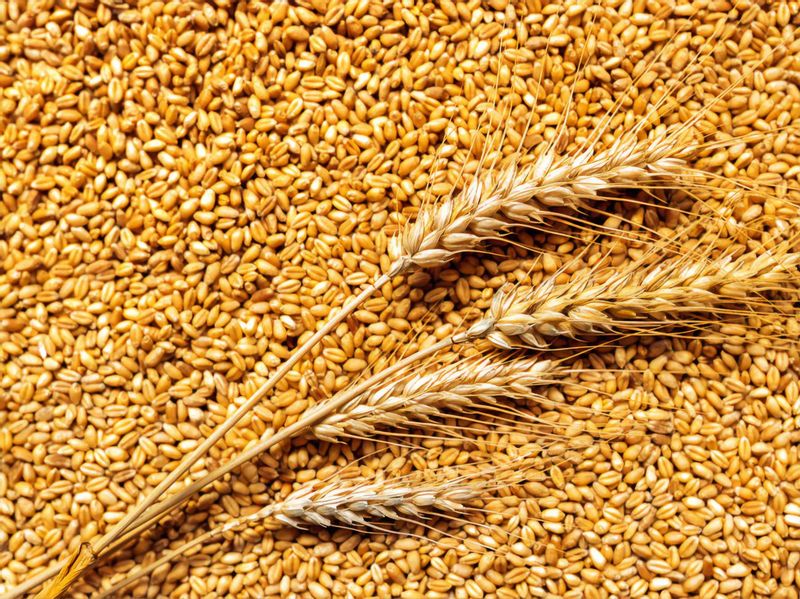Islamabad’s wheat largesse for cash strapped Kabul

The government on Monday approved a donation of 50,000 metric tons of wheat to Afghanistan, as it expedited the process to facilitate trade and travel of people across the borders in the absence of any major assistance from the world community.
The Economic Coordination Committee (ECC) of the Cabinet convened in the federal capital and approved the 50,000 metric tons wheat in donation, a senior official of the Ministry of National Food Security and Research confirmed to The Express Tribune.
With the approval of the donation, Pakistan has matched a similar offer by India that it gave many weeks ago. But the delivery of the Indian wheat remained pending because of the non-resolution of logistic issues between Islamabad and New Delhi.
Millions of Afghans would face starvation this winter unless urgent action was taken, the UN World Food Programme (WFP) had warned last month. It said that more than half of the Afghan population – about 22.8 million people – face acute food insecurity, while 3.2 million children under-five could suffer acute malnutrition.
After the takeover by Taliban on August 15, the international community, including the Muslim world, has not provided any meaningful support to the war-torn country on the pretext that the Taliban have not fulfilled promises on a broad-based inclusive government and rights of women.
Pakistan has promised to stand with the Afghan people but its ambitions are marred by scarcity of the resources. Prime Minister Imran Khan has also announced Rs5 billion or $28.4 million in aid for Afghanistan during an Apex Committee meeting of the Afghan Inter-Ministerial Coordination Cell (AICC).
This included a donation of 50,000 metric tons of wheat worth about Rs2.5 billion, according to the Ministry of National Food Security and Research. The ECC was informed that Pakistan had sufficient stocks available to provide the commodity to the neighbouring country.
The government-owned Pakistan Agricultural Storage & Services Corporation (Passco) has 2.7 million metric tons as of last week. The country has so far imported 1.9 million metric tons of wheat in this fiscal year to meet domestic shortages.
After releasing all obligations, the country will have a net stock of 771,578 metric tons by the start of food year 2022, stated the Food Ministry. The Finance Ministry has been directed by the ECC to bear the expenses involved in the supply of 50,000 metric tons of wheat, including logistic cost.
A senior government official told The Express Tribune that the apex committee meeting of the AICC decided that the already announced Rs5 billion in-kind support to Afghanistan should be fast tracked.
The sources said that it had been decided that life-saving drugs worth Rs500 million would be provided to Afghanistan. Similarly, winter supplies and shelter would be provided through the National Disaster Management Authority (NDMA), including 1,500 tents, 8,500 blankets and tarpaulin of 14,000.
Any amount that will be left out of Rs5 billion, would be given in rice, the sources said, adding that Prime Minister Imran Khan also directed the Finance Ministry and the Establishment Division to expedite processing the pending summaries for additional posts at the Western border.
The Federal Investigation Agency (FIA) has demanded 509 additional posts, while Customs Department has requested for 312 posts for smooth functioning of the bilateral trade.
Imran also directed for a review of the possibility of reducing Pakistan International Airlines (PIA) fares for Afghanistan, which are found to be higher in comparison to other airlines. The PIA chairman will review the possibility to reduce fares and submit a proposal to apex committee.
A proposal has also been discussed to start a bus-service between the two countries. In this regard, the Communication Ministry, Khyber Pakhtunkhwa and Balochistan governments will formulate an implementation plan for the bus service for Peshawar-Jalalabad and Quetta-Kandahar routes.
According to the sources, Pakistan, in principle, had also given the approval for a scheme under which skilled Afghan refugees, who were willing to work in Pakistan, could be paid salaries in Pakistan while they could maintain their POR cards.
For the purpose, the State and Frontier Regions (Safron) Ministry will identify the number and skill proficiency of Afghan refugees, eligible under this scheme, and present an actionable proposal to the apex committee for final approval of the prime minister.
The sources said that it had been decided to relax the visa restrictions to facilitate movement of people. The government would resolve the issue of overstaying Afghans in Pakistan. It might allow travel of Afghan children under-12 without passport, said the sources.
The sources said that the government had decided to facilitate International organisations staff who wanted to work in Afghanistan. It had decided that the time allowed for security clearance of visas for Afghans in the categories that need security clearance would be reduced from 30 days to 15 days.
If no response was received, the clearance would be deemed to have been granted and the visa would be issued thereafter by the Pakistani mission and consulate, said the sources.
The Commerce Ministry had been directed to revisit the Afghan export items for which transit rationalisation could be undertaken, keeping in mind the need for remaining as flexible as possible at this time of need for Afghanistan, said the sources.
Read also
Victoria Golubyatnikova, SGS – Speaker at BLACK SEA OIL TRADE-2025, Bucharest
Over 700 thsd tons of Ukrainian grain were exported
Moldovan government approves sale of Giurgiuleşti port to Romania
In Central Russia, oilseed crops overtook wheat in terms of sown area for the firs...
Sunflower seeds harvest forecasts: Drought hits Ukraine, while Russia and Kazakhst...
Write to us
Our manager will contact you soon



